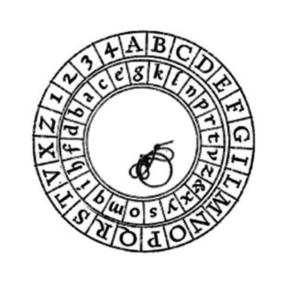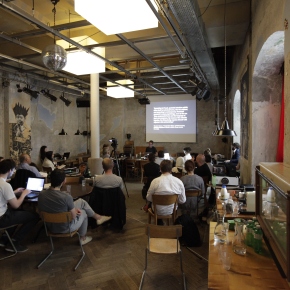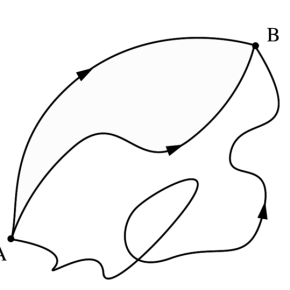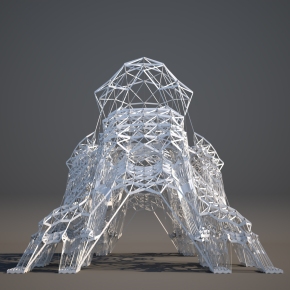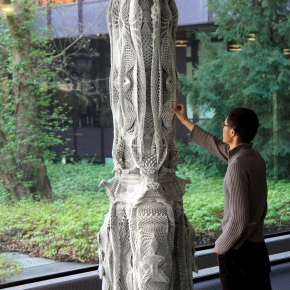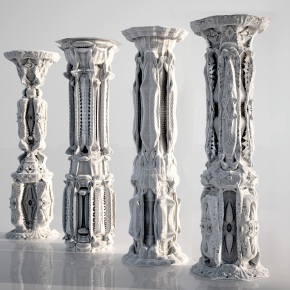by Vera Bühlmann author’s manuscript. In his Ten Books on Architecture, the Roman architect Vitruvius gathered all the existent knowledge on architecture in one comprehensive treaty including the building of temples, of course, but also the construction of clocks (gnomon, sun-dials) and the fabrication of machinery. The dedicated aim of gathering all the distributed knowledge … Continue reading
Category Archives: Projective Theory of Technology
Invariance
by Vera Bühlmann author’s manuscript. The main inclination this article will try to develop concerns a danger that Michel Serres has stated as follows: not to confuse invariance and identity.[1] Jacques Monod, to whom Serres refers with this statement, has pointed out the source of this likely confusion with regard to what he calls the … Continue reading
MANUSCRIPT // The creative conservativeness of computation
(Alternative title: The Secretive Conservativeness of Computing) *this is the manuscript (in draft character) of my paper delivered at the “Within the Domain of the Sun’s Inverse, or: Where are we when we are thinking computationally?” Seminar (cf the documentation of the event). »The philosophical role of the sun has transformed many times, but it … Continue reading
Symbolic Solids, or: exploring Architecture’s Inverse // Architecture beyond Design
This is the documentation of my talk at The Building conference Columbia University GSAPP, organized by Jose Araguez with Aaron White. The Building 15 November 2014, 9:30am to 5:30pm, Wood Auditorium, Columbia University GSAPP Ever since the theoretical turn of the 1960s, right through to the present, the status of the architectural object in the sphere of history, … Continue reading
An Architectonics of Crystallization
This is the new program for the theory modules I am teaching at the Master of Advanced Architecture Program “Architecture and Information” at CAAD, ETH Zürich. “Over several centuries, from the Greeks to Kant, a revolution took place in philosophy: the subordination of time to movement was reversed, time ceases to be the measurement of … Continue reading
PhD Colloquy Winter 2014/15 || An Untimely Nature of Communication: The Cyphered Reality of Channels
….and: The Birth of Geometry in Encryption and Deciphering–Towards a Physics of Communication. “Bacteria, fungus, whale, sequoia, we do not know any life of which we cannot say that it emits information, receives it, stores it and processes it. Four universal rules, so unanimous that, by them, we are tempted to define life but are unable to do so, because … Continue reading
On Michel Serres’ book The Natural Contract (1990): “Cosmoliteracy – the Alphabetization of the Nature of Thought”
This is the manuscript of my talk at the joint annual conference of the Society for European Philosophy and the Forum for European Philosophy, September 3-5 2014 at Utrecht University, with the annual theme: Philosophy after Nature. Cosmoliteracy – the Alphabetization of the Nature of Thought by Vera Bühlmann A-cosmic philosophies have only language or politics, writing … Continue reading
Materialism Without Territory. Art and the Environment
A two-day seminar which took place on Friday 30th and Saturday 31st of May 2014 at Cabaret Voltaire, Zurich, which I co-organized together with Jorge Orozco for the Chair for CAAD at ETH Zurich, laboratory for applied virtuality. The event’s website with videos of the lectures is here: http://materialismwithoutterritory.wordpress.com. (click on the titles of the program below to be … Continue reading
SUMMER COURSE: A SEMINAR ON »Information Societies and the Questions of Subjectivity and Identity«
MEDIACY, COMMUNICATION AND MODERNITY This is the schedule for a seminar that is about to start for the MAS Postgraduate Course Architecture and Information at ETH Zurich. We meet once a week on Monday afternoons, in order to encode and decipher together some of the »intellectual magnitudes« that are formalized in the key vectors which constitute … Continue reading
New Website (in the making) // The applied virtuality theory-lab
The applied virtuality theory-lab: projective theory on technics in symbolic environments (information, data, code) http://appliedvirtualitylab.wordpress.com at the Chair for CAAD, Institute for Information Technology in Architecture ITA, Swiss Federal Institute of Technology ETH in Zürich. Continue reading
Atomism, Alphabet, and Idiosyncrasy (the amorous nature of intellectual conception)
The manuscript for my lecture at the QUANTITY AND QUALITY, THE PROBLEM OF MEASUREMENT IN SCIENCE AND PHILOSOPHY conference at UC Davis, CA, April 5/6 2014, organized by Prof. Nathan Brown. ************************************************************** CONTENTS The first cycle: Homothesis as the Locus in Quo of the Universal’s Presence 1st Iteration (acquiring a space of possibility) 2nd Iteration … Continue reading
Arché, Arcanum, and Articulation. What is at stake with the notion of the universal ?
CONTENTS 0 précis I Genericness as the symbolical body of reciprocity Enunciating the universal Universal text, generic code, pre-specific data Ada Lovelace, the Enchantress of Numbers Algebraic Paradigms II Lemmata in how to theorise the universal while remaining neutral on matters of believe Lemma 1: Universality in terms of objectivity Lemma 2: Universality in terms … Continue reading
manuscript for the gta ETH conference “universal – specific”: The question of ‘signature’ and the computational notion of ‘genericness’
“…linguistics has just provided the death of the author with a precious analytical tool, by showing that the complete utterance is an empty process that functions perfectly without the need for filling it with its individual interlocutors: linguistically speaking, the author is never anything more than he or she who writes, in the same way … Continue reading
New book out! Sheaves – when things are whatever can be the case
by Ludger Hovestadt, Vera Bühlmann, published as Vol. II in our Applied Virtuality Book Series (ambra, Vienna/Austria) This is a book that holds the intellectual wealth of our world to be elemental. Today, the classical architectonic elements of form, quantity, units, numbers, principles, foundations are all constituted by information, and by literacy. Artefacts are things … Continue reading
Printing Architecture: Michael Hansmeyer’s and Benjamin Dillenburger’s Digital Grotesque
My colleagues have realised the first large scale instance of printed architecture, and they call it the Digital Grotesque. A disturbingly beautiful piece about which they say: We aim to create an architecture that defies classification and reductionism. We explore unseen levels of resolution and topological complexity in architecture by developing compositional strategies based on … Continue reading
Signification | Communication: theory and applications of glossematic coding as method for pre-specific modeling
The next PhD Kolloquium (Winter 2013/14) Computing symbols as literacy and ability starts next Tuesday September 24th. download the flyer here: PHD_KolloquiumWS13_flyer «The entities of linguistic form are of “algebraic” nature and have no natural designation; they can therefore be designated arbitrarily in many different ways.» (Louis Hjelmslev) Since Claude Shannon‘s Mathematical Theory of Communication (1936), the notion … Continue reading
The question of ‘signature’ and the computational notion of ‘genericness’
Abstract for the Universal – specific. From analysis to intervention? conference organized by ETH Zürich, D-ARCH Department of Architecture, Institute for the History and Theory of Architecture (gta), Prodoc Art and Science Keywords: Michel Serres; the algebraic quantity notion; computability; literacy ********************************** “By world-objects I mean tools with a dimension that is commensurable with one of … Continue reading
Articulating a thing entirely in its own terms Or: what can we understand by the notion of «engendering» ?
CONTENT What is the subject of the generic? Grammatizing symbolical domains An abstract object’s integrity: political subjectivization Beyond urban comfort, in a state of expulsion Generic as an adverb, universality as an ouevre Bodies of thinking live in algebraic universality Characterizations of the subject of the generic Characterization on a grammatical level The man without … Continue reading
Summer 2013 Phd Kolloquium on ‘computing symbols as literacy and ability’
Information – in the light of the strange theory of light and matter (quantum electrodynamics) According to Shannon & Weaver’s mathematical theory of information, information is strictly speaking neither a value (number) nor a magnitude (quantity), but it can be treated symbolically in terms of so-called random variables: values governed by chance. But how can we … Continue reading
Offen ist abstrakt. Für eine Philosophie der Künstlichkeit, oder: Das Generelle lebt seine eigene Geschlechtlichkeit
Unter der Bezeichnung Open Design beginnt sich gegenwärtig das Label für eine Aufmerksamkeit herauszubilden, welches eine bestimmte Wiedererkennbarkeit, Einschätzbarkeit und Entwicklungstendenz in den aufkommenden Infrastrukturen zu indexieren sucht, in denen heutige „Produkte“ – so allgemein gesprochen wie es die Anwendbarkeit des Begriffs Design heute eben verlangt – ausgedacht, entwickelt, hergestellt, verteilt und erworben werden. Dabei … Continue reading
Limitudinality. Data space is quantum reality.
The colonization of categories, or: how can we conceive of that which is being named by polynomials resolved through adjoining complex roots to their coefficients? “Le fondement c’est donc ce qui nous donnera ou ne nous ne donnera pas le droit.” (Gilles Deleuze, Qu’est-ce que fonder?) “I really do not know that anything has ever been … Continue reading
»popularizing insistence«
»popularizing insistence« was the fourth Klausur in a series of events which I organize at the Laboratory for Applied Virtuality (CAAD, Institute for Information Technology in Architecture, Swiss Federal Institute of Technology ETH in Zurich) in collaboration with the Stiftung Werner Oechslin in Einsiedeln, Schwitzerland. It took place from Feb. 1-3 2013, and will shortly be documented on … Continue reading
»printed physics«
»printed physics« war die erste Klausur in einer Reihe von Veranstaltungen, die ich am Laboratory for Applied Virtuality (CAAD, Institute for Information Technology in Architecture, Swiss Federal Institute of Technology ETH in Zurich) zusammen mit der Stiftung Werner Oechslin in Einsiedeln, Schweiz, organisiere. Technology is not simply technology, it changes character over time. We suggest there is a … Continue reading
»domesticating symbols«
»domesticating symbols« war die zweite Klausur in einer Reihe von Veranstaltungen, die ich am Laboratory for Applied Virtuality (CAAD, Institute for Information Technology in Architecture, Swiss Federal Institute of Technology ETH in Zurich) zusammen mit der Stiftung Werner Oechslin in Einsiedeln, Schweiz, organisiere. Technology is not simply technology, it changes character over time. We suggest there is … Continue reading
»symbolizing existence«
»symbolizing existence« war die dritte Klausur in einer Reihe von Veranstaltungen, die ich am Laboratory for Applied Virtuality (CAAD, Institute for Information Technology in Architecture, Swiss Federal Institute of Technology ETH in Zurich) zusammen mit der Stiftung Werner Oechslin in Einsiedeln, Schweiz, organisiere. Technology is not simply technology, it changes character over time. We suggest there … Continue reading
Continuing the Dedekind Legacy – Computing within the open totality of what can be the object of thought
abstract The paper presents an architectonic notion of computation in the philosophical sense, which depart from the genuinely algebraic ideas in number theory that have been articulated a.o. by Richard Dedekind. Such a perspective interprets the idea of singularity (Ray Kurzweil) as a hubris in the Fregean positivist tradition relying on some „third empire of … Continue reading
The idea of a Characteristica Universalis between Leibniz and Russell, and its relevancy today
Abstract In this post I will investigate the Leibnizian idea of a Characteristica Universalis from a comparative point of view on two diverging paradigms on computation that can be distinguished, as I will argue, to have emerged since the end of the 19th century. While algebraists like Augustus de Morgan, George Boole, Charles Sanders Peirce … Continue reading
Shape Grammars beyond their analytical application
Die Modelle von Benjamin Dillenburger erinnern unmittelbar an die Hängestrukturen, die wir von Gaudi kennen. Bei einem zweiten Blick jedoch zeigt sich eine Irritation: Verglichen mit der Natur-Ästhetik, die mit Gaudi assoziiert wird, stellen Dillenburger‘s Modelle sich in einer „unnötig“ differenzierten Gestalt dar – unnötig deshalb, weil Gaudis Hängemodelle als Inbegriff für eine Art „natürlicher … Continue reading
Neo-baroque Articulation of Columns: Modules, Solids, Units
We are familiar with the use of generative grammars, L-systems or other recursive procedural frameworks, similar to the subdivision generally applied here in the work of Michael Hansmeyer, mainly from the analysis of natural process and organic structures. What is extraordinary about these examples here is the fact that Hansmeyer does not seek to reference … Continue reading
architectonic articulation – the stanzaic structure of genuinely procedural shapes
Most architects working with CAAD today are, at least from the perspective of their daily practice, well familiar with what constitutes the main topos in Deleuzes’ and Guattaris’ text „Geology of Morals (Who Does the Earth Think it is)“ [1], namely the assumed primacy of code to form. However, the dynamics of concretion which is proposed in … Continue reading
Object Oriented Philosophy (OOP) – or turning the Style of Neue Sachlichkeit into a philosophical Doctrine ?
This post ist stimulated by a recent lecture given by Gilles Retsin at the CAAD Chair at ETH in Zurich entitled “Object Oriented Design”. It raised an interesting thought regarding this new and highly popular theory wave called Object Oriented Philosophy or Object Oriented Ontology (associated with Graham Harman, Levi Byrant, Timothy Morton a.o.), which is emphatically welcomed by … Continue reading
Within the Republic of Things – what architectonic form would the Roman Capitol have if it were transformable today into a philosophical school?
“All algebraic inquiries, sooner or later, end at the Capitol of modern algebra over whose shining portal is inscribed the Theory of Invariants.” This writes Arthur Cayley in a letter, around 1850, to his friend James Joseph Sylvester [1]. It strangely resonates, as a statement, with another very famous saying, namely every road leads to Rome. … Continue reading
Projective theory on technology: an emphatic plan
something like an inverted manifesto (evocatio). A projective theory on technology is interested in equipping and furnishing a realm for considering technology as intellectual, not as rational or materialist. Our interest is to enrich the operational and generic understanding of technical principles with world. This perspective allows us to engage in a kind of inverse … Continue reading
Michel Serres: Revolution Cognitive et Culturelle (engl. translation)
(translated by Aoife Rosenmeyer) In prep school classes there always came a day which we called ‘the day of inversion’. On that day….the elders [the teachers] had to kowtow to the wind of retribution. But this only lasted for a day. And whatever happened in this reversal, it was never the case that the weakest in … Continue reading
How to theorize technology today?
the excerpts below are work in progress of how to communicate our interest, at the laboratory for applied virtuality, in how to theorize technology. We are searching for a way to overcome the dis-proportionality we perceive today between the actual power and level of abstraction of the technology with which we plan, build, decide and live … Continue reading
PHD Kolloquium Winter 2012: Computability in the light of the Master Argument
download flyer PhD Kolloquium in Projective Theory on Technology, Wintersemester 2012, LAV CAAD Swiss Federal Institute of Technology ETH Zürich, Switzerland Computability – considered in the light of the Master Argument Computation is largely treated today as the procedure to »mechanize« »logics«. Our interest with a projective theory on technology is not to reject (negate) or … Continue reading
PHD Kolloquium Summer 2012: Computation, and the question of the applicability of arithmetics
PhD Kolloquium in Projective Theory on Technology, Summer semester 2012, LAV CAAD Swiss Federal Institute of Technology ETH Zürich, Switzerland download flyer Computation is treated today as an art, just as Mechanics had been in the Renaissance and the Baroque periods. This basically means that its actual performance is widely recognized and welcome, striking in effect, … Continue reading


